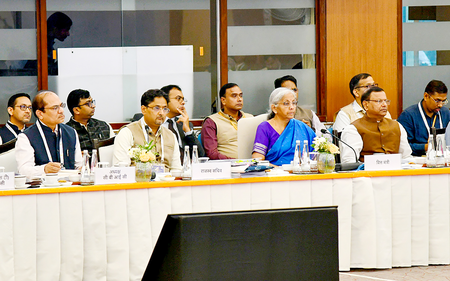New Delhi, 14 September (IANS). Lowering GST rates on automobiles, food processing, apparel, logistics and handicrafts will strengthen supply chains and boost local manufacturing. Also, especially there will be more employment opportunities for women, rural entrepreneurs and workers in informal sector. This information was given by the government.
For example, low GST on two -wheelers, cars, buses and tractors will increase demand, leading to MSME in the fields of tires, batteries, glass, plastic and electronics.
Affordable bicycles prove to be helpful for Gig workers, farmers and rural traders and cheap cars are helpful for MSMEs and dealerships in small cities.
Reducing GST on tractors (less than 1800 cc) to 5 percent strengthens the leading position in India’s global tractor manufacturing and helps auxiliary MSME. GST on commercial cargo vehicles (trucks, delivery vans) has been reduced from 28 percent to 18 percent, which has reduced freight, logistics cost, inflation pressure and MSME truck owners have benefited.
The GST on buses (10+ seats) has been reduced from 28 percent to 18 percent, which has reduced the cost of fleet operators, schools and improvement in fare abnormal for laborers.
GST on most foods has been reduced from 12 percent/18 percent to 5 percent or zero, which will benefit MSMEs associated with food processing, small-level processors, regional brands, dairy cooperatives, packaging and cold storage.
In addition, GST on chocolate, cake and confectionery will increase sales of small sweets manufacturers. The dairy sector will benefit from getting zero on milk and cheese, reduced from 12 percent to butter and ghee from 5 percent. This will benefit farmers, self -help groups, women -led enterprises and will promote nutrition security. GST on milk compartments has been reduced from 12 percent to 5 percent.
GST on man -made fibers has been reduced from 12 percent to 5 percent, which has improved the inverted fee structure and increased competition for MSME textile manufacturers and exporters.
Now GST has been reduced to 5 percent on readymade garments up to Rs 2,500, which will increase demand in Tier-2/3 cities and labor-dominated apparel units, especially women will benefit.
GST on leather products has been reduced from 12 percent to 5 percent (less than Rs 2,500 per pair), which will benefit the MSME of the footwear construction sector.
The GST on cement has been reduced from 28 percent to 18 percent, which will reduce the cost of housing and support PMAY, which will promote jobs in mining, manufacturing and logistics.
GST has been reduced from 12 percent to 5 percent on agro -based wood products (rice husk boards, bamboo floors, etc.), which will help MSME wood product units.
The low rates of GST have made essential commodities, raw materials and services more economical, which encouraged small and medium enterprises and start-ups to expand their operations, invest in innovation and compete domestic and globally.
The government said that these reforms support manufactured goods, processed foods, costumes, and even environmentally friendly products accessible at low costs, supporting women-linencies and labor-dominated industries, promoting economic inclusion of laborers as well as laborers of rural, semi-urban and informal sector along with urban manufacturers.
-IANS
ABS/
















